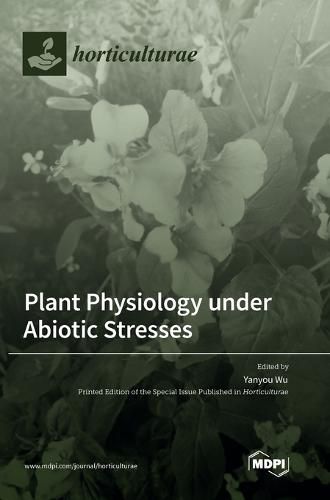Readings Newsletter
Become a Readings Member to make your shopping experience even easier.
Sign in or sign up for free!
You’re not far away from qualifying for FREE standard shipping within Australia
You’ve qualified for FREE standard shipping within Australia
The cart is loading…






This title is printed to order. This book may have been self-published. If so, we cannot guarantee the quality of the content. In the main most books will have gone through the editing process however some may not. We therefore suggest that you be aware of this before ordering this book. If in doubt check either the author or publisher’s details as we are unable to accept any returns unless they are faulty. Please contact us if you have any questions.
Abiotic stress includes not only single adversities, i.e., drought, salt, temperature, and elevated CO2, but also complex stresses, i.e., saline and alkali soil, and karst environment. Abiotic stresses strongly affect many aspects of a plant's substance and energy metabolism. Meanwhile, abiotic stress not only affects the physiological processes of photosynthesis, water metabolism, and inorganic nutrient absorption, but it also influences the electrophysiology and other physical parameters of plants. Plant physiological information, especially online physiological information, helps us to understand the plant's adaptive mechanism and take the effective measures to improve the production of horticultural plants. This Special Issue contains a collection of 11 important research works, which deepen the connotation and expand the denotation of plant physiology under abiotic stress. These works will provide a theoretical basis for the production of horticultural crops under single stresses, such as drought and salt stress, or under complex stresses, such as saline and alkali and karst environments. Readers from all over the globe are expected to greatly benefit from this Special Issue collection both in terms of their own work and to improve the productivity of horticultural crops under complex abiotic stresses. In the future, we hope that the field of plant (horticultural crop) physiology under abiotic stresses flourishes in terms of academic research and publications.
$9.00 standard shipping within Australia
FREE standard shipping within Australia for orders over $100.00
Express & International shipping calculated at checkout
This title is printed to order. This book may have been self-published. If so, we cannot guarantee the quality of the content. In the main most books will have gone through the editing process however some may not. We therefore suggest that you be aware of this before ordering this book. If in doubt check either the author or publisher’s details as we are unable to accept any returns unless they are faulty. Please contact us if you have any questions.
Abiotic stress includes not only single adversities, i.e., drought, salt, temperature, and elevated CO2, but also complex stresses, i.e., saline and alkali soil, and karst environment. Abiotic stresses strongly affect many aspects of a plant's substance and energy metabolism. Meanwhile, abiotic stress not only affects the physiological processes of photosynthesis, water metabolism, and inorganic nutrient absorption, but it also influences the electrophysiology and other physical parameters of plants. Plant physiological information, especially online physiological information, helps us to understand the plant's adaptive mechanism and take the effective measures to improve the production of horticultural plants. This Special Issue contains a collection of 11 important research works, which deepen the connotation and expand the denotation of plant physiology under abiotic stress. These works will provide a theoretical basis for the production of horticultural crops under single stresses, such as drought and salt stress, or under complex stresses, such as saline and alkali and karst environments. Readers from all over the globe are expected to greatly benefit from this Special Issue collection both in terms of their own work and to improve the productivity of horticultural crops under complex abiotic stresses. In the future, we hope that the field of plant (horticultural crop) physiology under abiotic stresses flourishes in terms of academic research and publications.